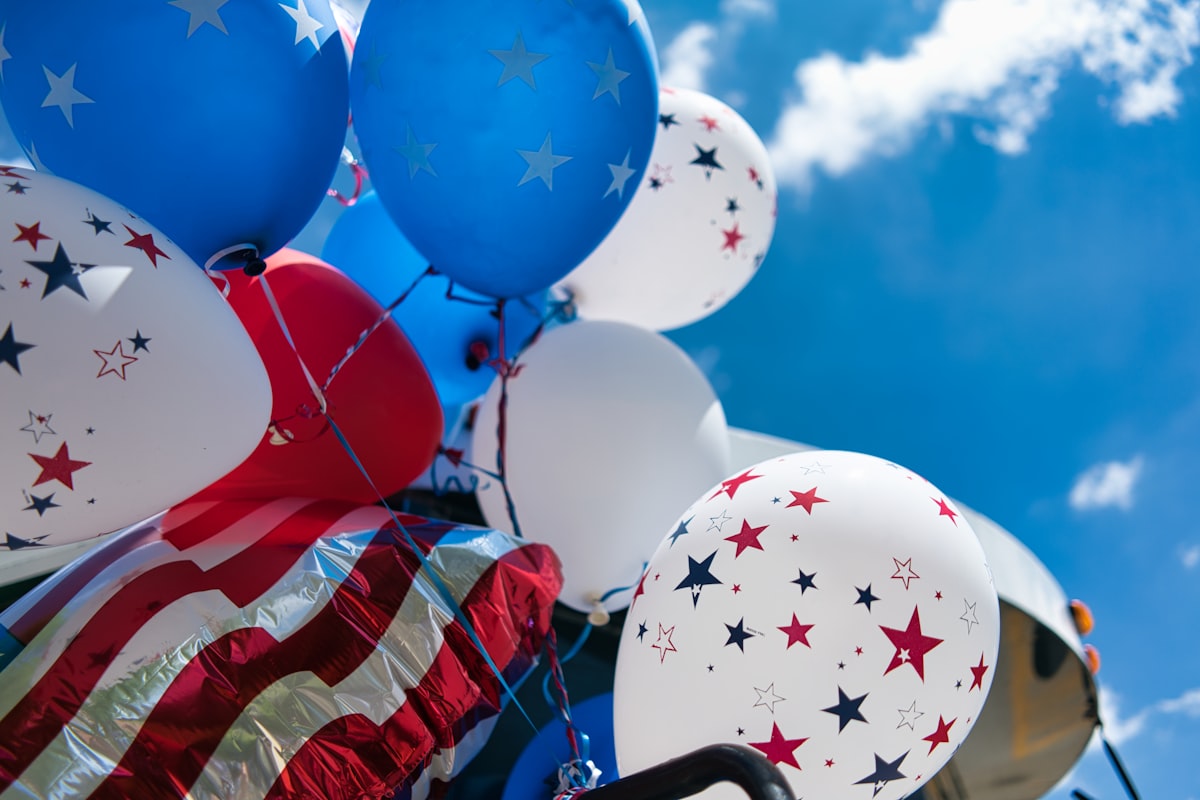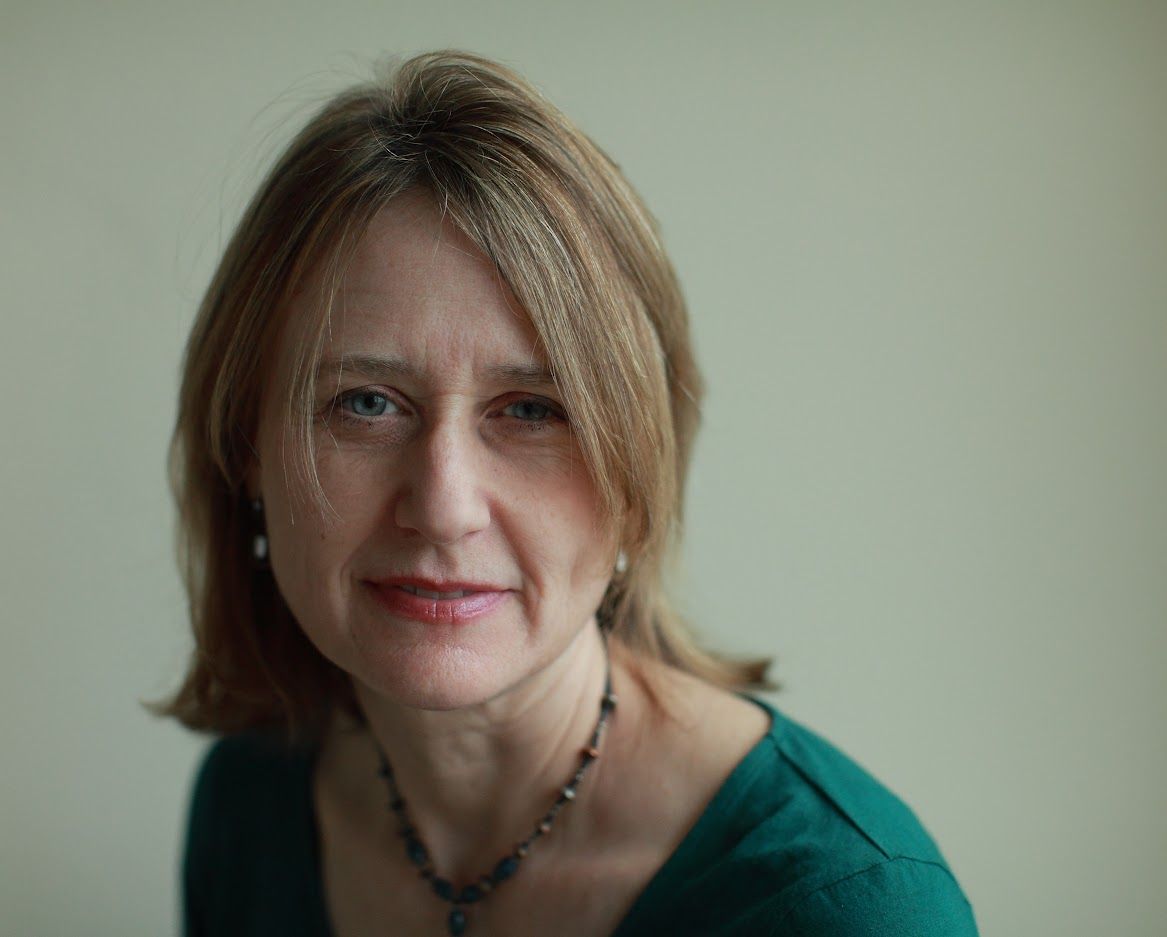Colleagues and Friends
It’s the first time in three months I’ve heard so much English, and between the bull and the barbeque, I can almost mistake it for home.

by Gail Folkins
On a Zurich tram, I adjust my straw hat in lazy-summer heat and watch new parts of the city drift by. I sit up when I spot a neon horse head over a shop until I realize it’s a butcher. I stare at the flier in my lap instead. “Come to an American Fourth of July in Zurich,” the headline says. It seems wrong to celebrate the Fourth during my year working at a branch office in Switzerland, but the director of the Swiss office, who happens to be a native Texan, has invited me. I can’t pass up fried chicken, fireworks, and the chance to make friends.
The tram drops me off at a park in front of a hotel where Americans saunter around a mechanical bull and a lawn filled with picnic tables. I pay my 15 Swiss Francs and look at the rows of tables surrounded by food and beer tables, wondering how I’ll find my boss. He finds me instead by standing up and waving.
“You made it,” Vance says in English. His wife and kids sit across from him.
“This is a good spot,” I say. Shorts and sandal-clad Americans are everywhere. It’s the first time in three months I’ve heard so much English, and between the bull and the barbeque, I can almost mistake it for home.
Vance laughs at me. “Reverse culture shock,” he says in his Texas accent. “People from England and Denmark are in the club too. It’s open to anyone who pays.” He turns toward his son, who waves a small American flag.
“Welcome, everyone!” A man dressed in jeans taps the microphone in loud puffs. “We’re glad you could join the American Club for this annual event. It’s time for our auction.”
The items range from trips to furniture, none of which I can afford. With the descriptions growing lavish and the prizes more ornate, some of the American picnic-goers begin to make jokes. The Swiss never make fun when someone speaks, and I begin to squirm like an outsider within my own culture.
A man on the other side of me stretches out his hand. “I’m Jim,” he says.
I shake his hand and introduce myself. Jim, redheaded with a booming laugh, is Irish American. Across from me sits Morten, a tall man from Denmark. His friend, a man with dark eyebrows over opaque eyes, introduces himself as Aaron. I’m glad to meet so many friends, or colleagues as they’re called in Switzerland – the German word Freund is reserved for romantic relationships.
“I’m from Seattle,” Aaron says.
I set my beer down and smile. “So am I.”
“How do you like Switzerland?” asks Aaron in English, clasping a beer in front of him. The American Club Fourth of July celebration whirls around us as if we’re not in Switzerland. Whoops of laughter come from a crowd at the mechanical bull.
“It’s beautiful,” I say. “But I have trouble with the laundry.”
He laughs. “The rules are different here.”
Morten and Aaron, who both write software for a Swiss bank, live downtown. I look at the ornate buildings that surround the park and listen to a metallic blue and white tram rumbling by, reminders we’re in Europe. I picture walking to market and sitting in coffee shops with the new colleagues I’ve met.
“So, you live in the country?” Morten says.
“It’s in a village about twenty minutes from Ennetbaden, where I work. Cows graze outside my apartment.”
Morten and Aaron laugh. “Do you ever get homesick for Seattle?” Aaron asks.
I adjust my hat. “I was homesick for Austin at first.” Over Aaron’s shoulder I make out the lake’s edge, the mountains peering over it. “Sometimes, this reminds me of Seattle.”
We hear a sizzling above us. “Fireworks,” someone at the table shouts. Just like home, exploding colors light up the clouds in flashes that make our faces glow. The crowd ooos and ahhs at just the right moments. Except for the jagged peaks in the distance, it’s hard to tell we’re in Switzerland. In a few weeks, I’ll celebrate an August 1 Independence Day honoring their first three cantons; the Swiss, too, have their fireworks.
When trails of smoke replace the final bursts, I give my new Fourth of July acquaintances business cards and walk away before I can feel shy about it. They pocket the cards on the way to their trams. There’s nothing wrong with making a few colleagues, I reason, and board the tram that’s pulled up at my stop.
Aaron e-mails me a few days after the Fourth. Maybe we can go hiking, he writes. The American Club is putting on a weekend hike in the mountains, their last hike of the season. I call the club office about signing up.
“If you haven’t been doing our hikes regularly,” says the coordinator in sharp Swiss German, “then I would not recommend this one to start.”
I’m somewhat fit, considering the fifty-six stairs to my apartment. I wait a moment to see if she’ll relent.
“It starts at 7 a.m.,” she adds.
“Thank you.” I hang up without registering. Ominous and early are a bad combination, so I resolve the whole thing by not going at all.
“She made it sound pretty tough,” I apologize to Aaron on the phone.
“I can’t believe she talked you out of it!” He sounds indignant, a response I didn’t expect. He acts as if I’ve broken a date, and I pause for a confused moment. “What if we do something else?” I say. We’re Swiss colleagues, after all, not Freund and Freundin. There’d be other chances.
The weekend after, I walk in front of Aaron on Pilatus, a mountain several hours from Zurich. The restaurant perches on a hillside nearby. Even though Aaron has changed our outing from an early morning climb to a company dinner, it still involves a cable car ride followed by a hike. I watch our breath swirl in the altitude and feel my ankles flex around the rocks.
Aaron catches up with me, and we stare at the cloud-encrusted peak ahead. His brown hair lifts, showing storm-colored eyes. “Look at my hands,” he says. They’re bluish-purple from the cold. Neither of us thought to bring gloves.
I splay numb fingers. “Me, too.”
Grabbing my arm, Aaron guides us inside the restaurant where spiced brats steam over checked tablecloths. Next to the meats are salads and plates of cheeses, with a carafe of wine beside each candle.
Aaron’s boss, just returned from the Swiss military, sits across from us. His eyes squint from years of mountain sun, yet still sparkle between the folds. He spears a bratwurst with his fork.
I consider the rifles he and most other Swiss have in their homes at the government’s bidding, a hidden militia I won’t see during my time here. Aaron’s gaze follows mine through the window. A vertical hillside sits below us in deceptive quiet. Unaware of possible bunkers within, mountain goats and marmots graze on its flowered surface.
Across the table, a co-worker calls to Aaron. “How old were you when this song came out?”
We stop eating and listen to the restaurant music, a Cindy Lauper song from the eighties. I see a group of Aaron’s co-workers, Morten among them, who wait for his answer.
Aaron smiles at the group. “About ten.”
While everyone at the table laughs, I calculate. Sure enough, he’s about nine years younger than me. Not that it matters; we’re colleagues. I stand up to find dessert on my own.
On the ride home, I lounge in the backseat of Morten’s sports car while Morten and Aaron sit up front. We’d gone from Pilatus to Aaron’s Zurich apartment for a drink, and now back to my village home. Aaron’s place was a surprise with its parquet wooden floors and a balcony overlooking downtown. With conveniences like a spare bedroom and added closet space, their apartment integrates American conveniences within a Swiss setting.
Aaron turns around in his seat. “It’s great how much you speak German,” Aaron says.
“It’s a way to improve,” I say. “Speaking it at work helps.”
Aaron turns back to face the front. “Our company has people from England and Denmark, so we almost have to speak English. I may take a class, though.”
“So we’re going to Tuergi?” Morten asks.
“That’s right. Turn here,” I motion and slump back again. Though my home is only a half-hour drive from Zurich, driving accentuates Swiss contrasts of modern city glow and ageless farmland. I consider Aaron’s year of exploration and its parallels to my own. The need to not only work but also to adapt and make connections.
We reach my apartment just as the first stars come out. I step outside the car, ready to wave goodbye to Aaron and Morten. Before I can walk away, Aaron is outside the car and standing in front of me. The night air turns our breath to fog. Remembering his reaction to the hike I’d canceled, I wait in the dark, unsure what our friendship requires. His arms circle me in a goodbye hug, and I hold on tight.

Originally from the Pacific Northwest, Gail Folkins has also lived in Switzerland and Texas. She is the author of two creative nonfiction books: Texas Dance Halls: A Two-Step Circuit and Light in the Trees, a nature-focused memoir. Her essay “A Palouse Horse” was a Notable Essay in The Best American Essays 2010.



